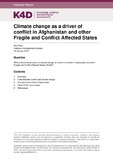| dc.contributor.author | Price, Roz | |
| dc.coverage.spatial | Afghanistan | en |
| dc.coverage.spatial | East Africa | en |
| dc.coverage.spatial | Kenya | en |
| dc.coverage.spatial | Somalia | en |
| dc.coverage.spatial | South Asia | en |
| dc.coverage.spatial | South East Asia | en |
| dc.coverage.spatial | Pakistan | en |
| dc.coverage.spatial | Syria | en |
| dc.coverage.spatial | Iraq | en |
| dc.date.accessioned | 2019-03-26T10:34:03Z | |
| dc.date.available | 2019-03-26T10:34:03Z | |
| dc.date.issued | 2019-01-18 | |
| dc.identifier.citation | Price, R.A. (2019). Climate change as a driver of conflict in Afghanistan and other Fragile and Conflict Affected States. K4D Helpdesk Report 527. Brighton, UK: Institute of Development Studies | en |
| dc.identifier.uri | https://opendocs.ids.ac.uk/opendocs/handle/20.500.12413/14424 | |
| dc.description.abstract | The report provides a brief account of the current state of knowledge of the links between climate change and conflict. It then presents relevant literature from Afghanistan (although this is limited), and finally examples from other countries or regions where links have been proposed (many of which can be considered fragile and conflict affected states (FCAS)). A growing number of researchers are linking climate change to violent conflict; however, robust scientific evidence of this relationship remains obscure and contested (for example the link between drought and the Syrian uprising). Although a direct, linear relationship between climate change and conflict is disputed, much of the literature agrees on an indirect link where climate-related change can influence factors that lead to or exacerbate conflict under certain circumstances. Hence, understanding how and under what circumstances these changes may lead to violent conflict is key. Much of the literature reviewed emphasises that policy responses to climate-related security risks need to acknowledge the complexity of the climate-conflict relationship through specific mechanisms, and to be adapted to specific local contexts. Political, spatial and temporal dimensions should also be included when studying these links. | en |
| dc.language.iso | en | en |
| dc.publisher | IDS | en |
| dc.relation.ispartofseries | K4D Helpdesk Report;527 | |
| dc.rights.uri | https://www.nationalarchives.gov.uk/doc/open-government-licence/version/3/ | en |
| dc.subject | Climate Change | en |
| dc.subject | Environment | en |
| dc.subject | Security and Conflict | en |
| dc.title | Climate Change as a Driver of Conflict in Afghanistan and Other Fragile and Conflict Affected States | en |
| dc.type | Helpdesk | en |
| dc.rights.holder | © DFID - Crown copyright 2019 | en |
| dcterms.dateAccepted | 2019-01-18 | |
| rioxxterms.funder | Department for International Development, UK Government | en |
| rioxxterms.identifier.project | K4D | en |
| rioxxterms.version | VoR | en |
| rioxxterms.funder.project | 238a9fa4-fe4a-4380-996b-995f33607ba0 | en |

